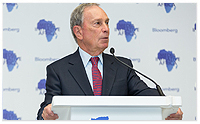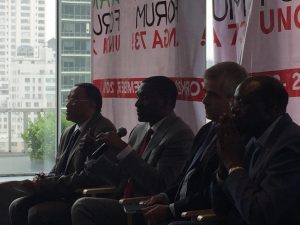By Uchenna Ekwo
Last week Michael R. Bloomberg, founder of Bloomberg L.P., philanthropist and 108th Mayor of New York City, launched in South Africa, the Bloomberg Media Initiative Africa, a three-year pan-African program envisaged to build media capacity in Africa.
Given my passion for developing the media in Africa, I was excited to learn about the Bloomberg’s initiative. I was even more excited because the former New York Mayor’s overtures to Africa resembles the Media Educational Development Initiative for Africa (MEDIA) promoted by Center for Media & Peace Initiatives, a New York based media and public policy think tank. What is more, Bloomberg’s plan mirrors an International Journalism Training Program for Diaspora journalists being supported by Center for Media & Peace Initiatives and Rutgers University’s School of Public Affairs and Administration.
Although Bloomberg deserves some credit for taking steps to support the media sector in Africa with $10 million of his money and shrewd business skill, one is concerned about the long term implications in relation to the issues and challenges in African journalism. How does the Bloomberg plan perpetuate, accelerate or decelerate the perceived negative coverage of Africa in the international media?
To understand the pains and gains of the Bloomberg Initiative let us consider the major planks of the Bloomberg Media Initiative Africa as announced by the former New York Mayor.

Former NYC Mayor
The initiative costing $10 million will be spent on convening international leaders and improving access to information in order to advance transparency, accountability and governance on the continent. The initial focus of the $10 million commitment will be on Kenya, Nigeria and South Africa to strengthen business and economic news coverage, expanding training programs for journalists and providing greater access to reliable data about Africa.
The rationale for this approach is that timely and accurate reporting of business and financial matters play critical roles in advancing efficient markets and economic and social growth.
The Bloomberg Media Initiative Africa will provide cross disciplinary education programs and mid-career fellowships to increase the number of highly-trained business and financial journalists; convene pan-African forums to examine worldwide media best practices, and support research to stimulate media innovations. It will also foster collaboration, support professional growth and nurture the leaders who are contributing to the continent’s very bright future by providing scholarships to the next generation of media professionals and experiential training opportunities to graduate students.
Clearly, there are so many sweeteners in the package, but as anemic and diabetic as the media and public sector in Africa are they should be careful with drinking tea with sugar.
The motive behind the formation of the Pan African News Agency (PANA) in the 80’s by the defunct Organization of African Unity (OAU) and now African Union (AU) was to counter what African leaders in political, diplomatic, and media circles considered as negative and distorted coverage of the continent by the western news organizations being beamed to Africa and the rest of the world. PANA as organization was born at the height of the New World Information and Communication Order (NWICO) controversy during the term of Amadou-Mahtar M’Bow as Director-General of UNESCO, a Senegalese national who drew the world’s attention to global imbalance in the flow of information between the North and South.
Like so many efforts from emerging countries, PANA could not survive as envisaged due to financial difficulties resulting from a host of factors including the nonpayment of levies by nearly all member states of OAU that agreed to fund the news agency. As we all know, in the business of international news, respect is matched with survival. So as PANA lost survival, it also lost respect.
The prestige of Bloomberg Business Empire including his media conglomerate is that it remains in the survival mode. Therefore, Africa in its paternalistic mode will more than open her hands ignoring the long term consequences to potential manipulation of Africans.
We live in a world led by ideas. Those who possess and push their ideas will continue to dominate the world. And the media is a vehicle for conveying ideas and dominating peoples thought processes. The world is going through an information revolution and winners in the revolution will emerge champions in the colonization of minds. This was part of the argument that I made in May 2012 when I had the privilege of addressing the Pan African Parliament in South Africa on the need to establish a global news network that focuses on telling Africa’s story the African way.
Having a truly African News Network that communicates to the world like Al Jazeera does for Arabs or CNN, FOX News, BBC do for America and Europe requires more than government involvement. The failure of PANA is a proof that government cannot and should not get involved in media business in Africa. It is bound to fail because any media organization that lacks freedom to inform as most in Africa do will ultimately loose the freedom to innovate, generate revenue or win the trust of the people.
The answer to establishing a robust Africa presence in the international media scene rests with the private sector and not government. It is still puzzling to me that African entrepreneurs are yet to understand the power of information in shaping the image of the continent or their businesses. The 11th richest man is Nigeria’s Mohammed Aliko Dangote and there are other billionaires including those silent ones who stole money from the public purse and yet none considers it a priority to invest in the media business the scale of CNN and others.
One thing that the Bloomberg initiative seems to have ignored is the excessive corruption in the media in Africa. I will recommend an investment on rooting out corruption in the media in the hope that it will help to eliminate corruption in the larger polity. Unknown to many, the media is central to reducing corruption in African societies. The incidence of graft is perpetrated in the public sector in many African countries because the media practitioners are also corrupt. Across Nigeria, Kenya, South Africa and others, democracy is in peril due to a corrupt media system that extorts money from politicians who in turn steal from the public coffers. It is a vicious cycle.
Perhaps, the eradication of corruption in the media should be the focus of Bloomberg Media Initiative Africa and other Africans such as Mo Ibrahim who have expressed interest in good governance. Good governance and good media system go hand in hand as demonstrated by several studies including one done by Afro Barometer in 2013 that found a strong correlation between effective media system and good governance.
Now that Bloomberg who understands the influence of the media is in Africa’s largest media markets – Nigeria, South Africa, and Kenya, I hope it should serve as both a turning point and turnaround for Africa’s richest men and women. They should wake up because a shrewd business man like Mike Bloomberg who excelled in managing the largest city in the world has seen something in Africa that many Africans have not seen. “If you see something, say something” became a famous slogan in New York and the rest of America after the attack on 9/11 in 2001. Bloomberg has seen something in Africa but he won’t say something but I, being an African by birth and having practiced journalism for many years in that part of the world, I see what Bloomberg has seen and I am saying something to Africa’s richest entrepreneurs—invest in the media and change governance in the continent.






